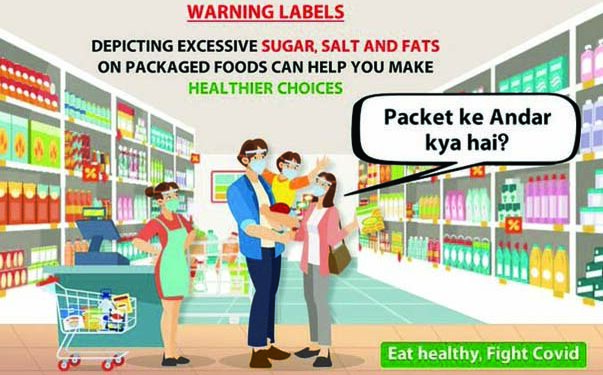R ARIVANANTHAM
CHENNAI, OCT 22
The Chennai-based Citizen Consumer and Civic Action Group (CAG) batted for simple, clear, interpretable warning labels that would be easily understandable for common and non-English speaking masses here on Friday.
Addressing a virtual media conference, Saroja, Executive Director, CAG said they had observed World Food Day (Oct 16) on October 21 in association with the Home Science department of the Women’s Christian College, Nungambakkam in Chennai on Thursday.
She said, “Unmonitored salt, sugar and fat intake poses a significant threat to the health of millions of Indians. To warn consumers about the nutrients of concern, we are calling for FoPL (Front of Pack Labelling) like warning labels. These are messages that need to be conspicuously placed in packaged foods, that will immediately warn consumers about the health risks of what they are about to consume. Such warning should be simple, clear, interpretable warning level that would be easily understandable for common and non-English speaking masses. The warning may be in the form of symbol.”
Dr Pradeep Agarwal, Associate Professor, Department of Non- Communicable Diseases (NCD), All India Institute of Medical Science (AIIMS), Rishikesh in Uttarakhand said, “One major reason for the Non- Communicable Diseases (NCD) during pandemic is the change in our dietary habits and lifestyle. We are increasingly taking processed foods that are often high on salt, sugar and/or fat that are major contributors to NCDs. In countries like Canada, Chile, Israel, Uruguay, FoPL on food products have proved to be successful in reducing intake of sodium and sugar. Therefore, it is important for India to come out with the FoPL regulations soon. Clear warnings about the presence of high salt, sugar and/or fat in packed food would help consumers make informed choices.”
Dr Hemamalini A J, Professor and HoD, Department of Clinical Nutrition, Sri Ramachandra Institute of Higher Education and Research (DU) said, “Nutrient profiling is a scientific method of categorizing foods according to their nutritional composition and is developed with the main objective of reducing consumption of salt, fat and sugar. Nutrition profile models (NPM) translate this into specific food and beverage targets and help us to identify foods that are high in salt, sugar, and/or fats. Based on the “limits” established by the NPM, the front-of-pack label informs consumers in a clear manner whether a product contains excessive sugar, salt and/or fat, thus helping them make healthier choices. Hence a science based NPM leading the way to a simple warning label, should be our topmost priority.”
While replying to a query, Dr Hemamalini said that the WHO has standardised the intake of food with defined calorie level as per the height and weight of a person like Body Mass Index.
In spite of Food Safety and Standards Authority of India (FSSAI) has started working on FoPL few years ago, the regulations are yet to be notified. Considering the seriousness of the issue, the authorities should come out with suitable regulations at the earliest keep the masses in mind.
Saroja said, the food we choose and the way we consume the nutrients of concern affects the health system. Diets high in salt, sugar and fat are major contributors to non-communicable diseases like cardiovascular disease (CVD), cancer, respiratory diseases, diabetes, etc which contribute to 71 % of all deaths globally every year. CVD has become the leading cause of mortality globally, resulting in 18.6 million deaths a year. In 2016, India reported 63% of total deaths due to NCDs, of which 27% were attributed to CVDs.
Studies reveal that 77 million people are diabetic in India, the second most affected in the world. All these chronic health conditions can be averted by reducing their dietary risks. Limiting the permissible amount of salt, sugar, fats and other harmful ingredients in packaged and ultra-processed food and beverages followed by a simple interpretive front of pack warning label are easy solutions to save more lives, she added.












